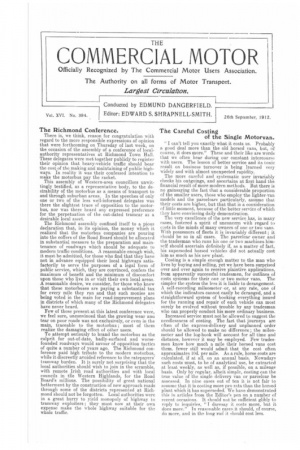The Richmond Conference.
Page 1

If you've noticed an error in this article please click here to report it so we can fix it.
There is, we think, reason for congratulation with regard to the more responsible expressions of opinion that were forthcoming on Thursday of last week, on the occasion of the assembly of a conference of localauthority representatives at Richmond Town Hall.
These delegates were met together publicly to register their opinion that heavy-vehicle traffic should bear the cost of the making and maintaining of public highways. In reality it was their confessed intention to make the motorbus pay the racket.
This assembly of Western-area councillors unwittingly testified, as a representative body, to the desirability of the motorbus as a means of transport to and through suburban areas. In the speeches of only one or two of the less well-informed delegates was there the slightest trace of opposition to the motorbus, nor was there heard any expressed preference for the perpetuation of the out-dated tramcar as a desirable local asset.
The Richmond assembly confined itself to a, pious declaration that, in its opinion, the money which it realized that the motorbus companies are pouring into the coffers of the Road Board should be allocated in substantial measure to the preparation and maintenance of roadways which should be adequate to modern traffic conditions. A reasonable-enough wish, it must be admitted, for those who find that they have not in advance equipped their local highways satisfactorily to serve the purposes of a legal form of public service, which, they are convinced, confers the maximum of benefit and the minimum of discomfort upon those who live in or visit their own local areas. A reasonable desire, we consider, for those who know that these motorbuses are paying a substantial tax for every mile they run and that such monies are being voted in the main for road-improvement plans in districts of which many of the Richmond delegates have never heard.
Few of those present at this latest conference were, we feel sure, unconvinced that the growing wear anu tear on poor roads was not exclusively, or even in the main, traceable to the motorbus ; most of them realize the damaging effect of other users. To attempt seriously to brand the motorbus as the culprit for out-of-date, badly-surfaced and worsefounded roadways would savour of opposition tactics of quite a number of years ago. The Richmond conference paid high tribute to the modern motorbus, while it discreetly avoided reference to the ratepayers' tramway burden. It is surely not surprising that the local authorities should wish to join in the scramble, with remote Irish road authorities and with local councils in the Western Highlands, for the Road Board's millions. The possibility of great national betterment by the construction of new approach roads through some of the districts represented at Richmond should not be forgotten. Local authorities were in a great hurry to yield monopoly of highway to tramway exploiters ; they must now at their own expense make the whole highway suitable for the whole traffic.






















